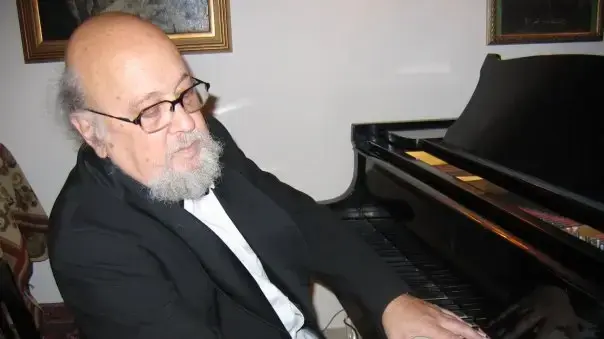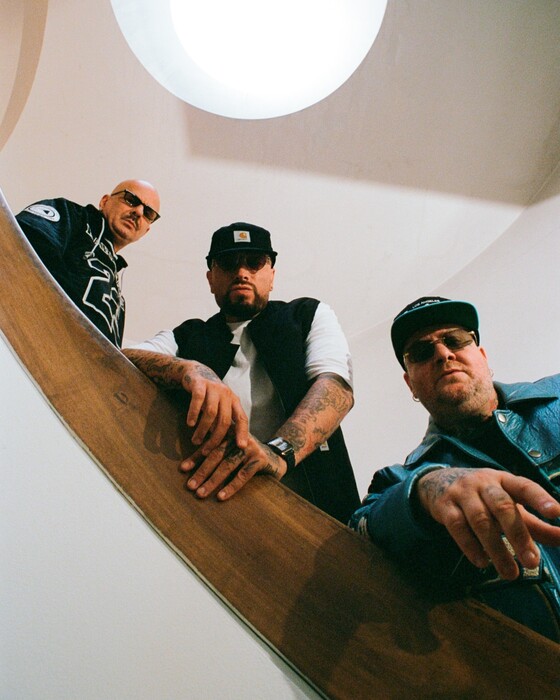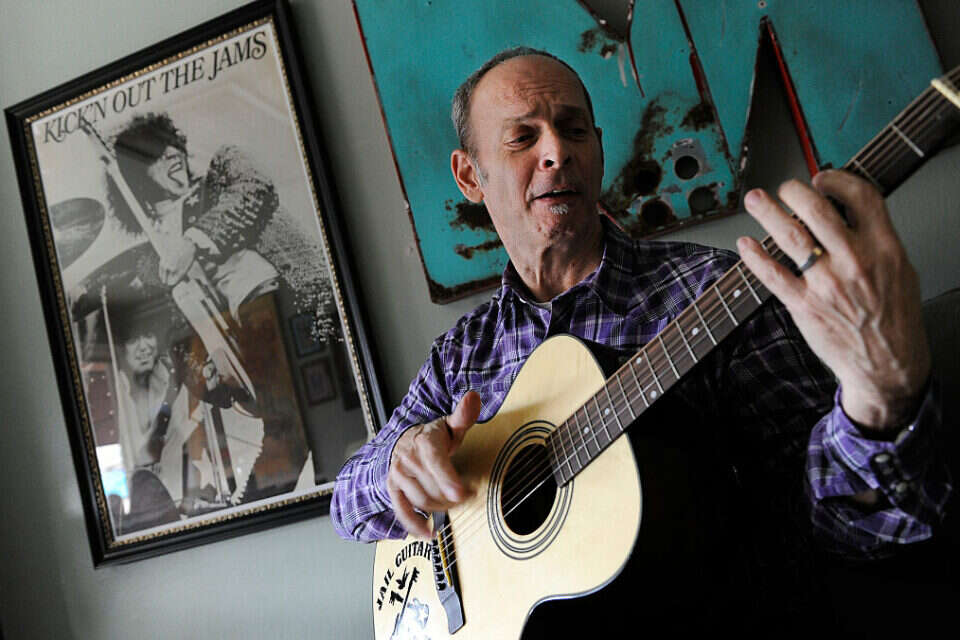We thought being closed in the house would finally make us do everything we didn't have time to do • There are singers who really did it - and put out great albums while closing themselves in a kind of isolation
The days of Corona, distance and isolation are true, but it is hard to say that most of us utilize them for real concentration and progress in our lives. It is not really our fault if we take into account the political blasts and political stagnation we have been in for too long. But now that we've transitioned into functional practice - between the walls of our home, here's where the real boundary lies between those who take the time to strive for greatness and those of us who upload to Instagram a video of their home fitness workouts. Understand, you do sports under siege as well. Now do Shakespeare and try to write a work like "King Lear" during an epidemic.
And he's not the only one. History tells of quite a few musicians who, for writing or completing their great work, chose to isolate themselves away from people and outside noises, in order to refine and exact their creative energies - or at the very least, not get any more stubborn water in Wattsap. Hard Hot Chili Pepperz recorded "Blood, Sugar, Sex, Magic" in a haunted mansion that Harry Houdini once lived in (for the ghosts - this is a testimonial based on Anthony Kiddis, but believe it in 1991, he had more squares in his stomach Dysfunctional brain cells); Beck recorded "Odelay" in a tiny room in the Dust Brothers' home; The Foo Fighters recorded more albums in Studio 606 located in Dave Grohl's basement until they can no longer remember what it's like to work in a normal studio (except for the one time they recorded an album in every possible studio in the United States). But we didn't want to tell them today.
Here are the stories of four albums created under voluntary isolation, a relatively limited space and the intent of their creators to step out of the dark with something iconic in hand. Just like your Instagram photos, you get drunk alone at home.
Bruce Springsteen - "Nebraska"
In 1982, Bruce Springsteen decided to streamline the process of recording his next album. While his last three albums "Born to Run", "Darkness on the Edge of Town" and "The River" were huge successes that marked him as the American Prince of Rock, he found that the way they were recorded was cumbersome and took too much hassle and precious time. "I realized that what always took me the most time in the studio was the writing process," he explained in an interview with Rolling Stone magazine later. "I would come to the studio and just the material wasn't ready, or it wasn't good enough. I would record for a month, finish a few things, go home and write more and then go back to the studio and record for another month. It wasn't very effective."
For the recording of his next album, the boss decided to write and record most of it on a very unsophisticated tape recorder, on which he recorded demos, skeletal versions of the songs he intended to perfect in the studio. In fact, he wrote all the lyrics to his house and recorded himself singing songs on instruments such as acoustic and electric guitar, harmonica, mandolin, pianist and keyboard. But when he and members of the Street Band accompanied him on the studio, they found that the home versions sounded better.
Springsteen and production partner Mick Balletine concluded that due to the fact that it was a very personal material and depending on the nature of the album, which dealt with difficult day people who faced challenges in their personal lives, they deserve a more minimalist acoustic production over rich and bombastic sound. That is, the original nude versions of the songs fit into a conceptual album. The result was the "Nebraska" album, a contemporary Springsteen folk classic, which proved to be a more rugged broker than distortion, thunderous drums and anthems. "Caste basically became the record itself," Springsteen said. "It's amazing, because I was just hanging around in my pocket without a box for two weeks, just carrying it on me. In the end, we understood and told ourselves 'this is actually the album'."
Music director John Landau claimed in an interview years later that "the right version of the album is the one that came out," but Street Island drummer Max Weinberg actually said in a decade ago interview that he had found the unreleased recordings, which have since won " Electric Nebraska, "no less than" killer. " These, by the way, were never released - or at least some of them, as a number of songs actually entered the singer's next album, "Born in the USA". There they are no doubt more suited to the nature of the materials.
Bon Iver - "For Emma, Forever Ago"
It's hard to think of an album that did more for its creator than Justin Vernon's, or its more familiar but less understood name - Bon Organ. If we shy away from the subject for a moment, the name "Bon Iver" is actually an inclusion of the French term "Bon Hiver" which means "good winter." You know, like the one we experienced this year. In other words, if "good" is meant to be a flood season and other precipitation that is out of control, then all who stand in their way and end up with a virus from the Underworld will probably continue with us until the summer.
But for our cause. Legend and the internet say that because of his unbearable heartbreak, Vernon shut himself in a cabin in Wisconsin, which is easy to imagine as a rickety wooden shack with a leaking roof and insects from every corner. It's not far from the truth, but it's actually his father's hunting lodge, which is about an hour away from his house. In case you were wondering - yes, it did have sewer pipes.
He and his father would spend occasional weekends in the chalet in question, which was located in a rural area that spanned 80 acres and was nicknamed "The Land." Vernon knew the area well from childhood, and saw it as a place where he could isolate himself away from people, bill payments, traffic noise, and other civilized sands who make judgments in an artist's ability to create without interruption. A bit like the guy from the movie "Into the Wild," just without the whole bit of killing by a bear (this isn't really a spoiler, since this is a movie from 13 years ago. If you haven't watched it until now, it probably won't happen anymore).
Vernon said his father would visit him in the cabin every ten days and provide him with basic necessities such as eggs, cheese and beer, and in return, he would carry out maintenance work for him, cut down trees and other tasks he would do in the cabin. Justin our friend spent a pretty hard winter sitting alone in the cabin, drinking beer and watching TV. In between, he also rose at sunrise due to the reflection of the light on the snow that surrounded him, sucked into 14-day writing sessions, lost his sense of time, and wrote one of the most beautiful and sad parting albums ever written, one that initially made him an indie sensation during the time when Indie fell in love with folk , And then the mainstream artist of the kind who wins the Grammy and has an artistic influence on bands like Coldplay. Or as he calls it - "a victory for my sanity."
Radiohead - "Ok Computer"
Highlights: Home recording doesn't necessarily mean it's cheap. Yes, there are those who have recorded masterpieces by minimal means, but there are also some who simply wanted to stay away, write and record their nascent material in a secluded place with tens of thousands of dollars. For example, the friends of Radiohead, who, after the huge success of their album "The Bends," received from their label "Perlophone" a hundred thousand pounds to purchase recording equipment. The record company's expectation of them, as the band members said, was to record a sequel to what has already been proven successful, and to make everyone involved more successful and wealthier. But as you would expect from a bunch of insanely talented but pretentious British artists, they decided to take the money and do just the opposite.
"The only concept we had for the album was that we wanted to record it away from the city and ourselves," guitarist Johnny Greenwood said. And so it was: The band rejected any offer for external production offered to them (except producer Nigel Goodrich who had worked with them before), and in July 1996 began work on the album in a kind of lair that turned into a studio in Oxfordshire. The decision to record an album alone turned out to be particularly stressful, creating a non-continuous nature of work and causing a lot of frustration among the band members.
After deciding that the space they chose did not provide them or contributes to a particularly healthy recording environment (according to York Thomson, this was due to the proximity of the "lair" to the members of the band, ie, not far enough. Greenwood actually wanted more rooms to eat and shower). The band for a short tour. When she returned, she went on record in another studio - this time at a country estate in Summerset, which belonged to actress Jane Seymour. Changing the atmosphere and conditions made the recording "Ok Computer" smoother and more comfortable, or as Greenwood described it in words - "It already felt less like a lab experiment, which is actually the feeling that there is usually in a recording studio, and more like a bunch of people recording their first album together ".
The new recording conditions not only mentally facilitated the band of musicians, but also contributed practically: York and his friends made use of different rooms of the estate, utilizing the different acoustics in each. Various corners of the house, such as a stone staircase, were used as recording sites, and the distance from the city allowed radioheads to work more efficient and less routine hours. About 80 percent of the album's songs were recorded live, at least that's how composer Ed O'Brien (who just now announced that he was in Corona) and most of his singing channels recorded York in one tap. The work on the album has ended in a number of other locations, including the legendary Abbey Road studios, but these are mostly Finnish and final mixes.
Radiohead's choice to record their fourth album at their own pace and rhythm, while choosing to isolate themselves as far away from external influences as possible, has brought to the world some of the band's major classics, including "Karma Police," "Lucky" and "Paranoid Android." That's how it is when there are no alarms or surprises.
The Rolling Stones - "Exile on Main Street"
Sometimes exile is also a form of isolation. Ask Dreyfus, or the Rolling Stones members, who in the late 1960s were already a successful band with a strong affection for narcotics and self-destruction, but those who really defeated them for a short period were the British tax authorities. Debts in the millions of pounds led the band's decision to leave the British Isle territory in favor of a kind of voluntary exile to the French territories, which in the south rented guitarist Keith Richards and his partner Anita Felenberg at a 16th-century mansion that was also used by the Gestapo. That's where the Stones decided to record their next album as well, and since "Sticky Fingers" was their last album recorded at Mick Jagger's kit in Hampshire, the concept of a mobile studio was no stranger to them.
The album recording period was chaotic, as you would expect from the world's biggest and wildest rock band in those days. At the time, Jagger enjoyed French bohemian life and most of the heroin supplies she provided to him and Richards, one of the biggest drug pigs known to rock 'n' roll. Long nighttime sessions brought together music, debauchery and particularly high summer temperatures. The size of the space and the amount of rooms on the site have invited a guest estate that desires to be a powder pellet on Richards' table, including John Lennon and poet William Williams. Burrows. All of this resulted in the nature of a recording that he called "liberated" would dispel the concept of precision as much as describing the Corona virus as a slight chill, and also stylistic eclecticism in the spirit of the album.
While parts of it were completed and recorded elsewhere, most of the "exile on Main Street" was shaped by the messy and wild scenes in that mansion. When the album came out, it received contradictory criticisms and was viewed for a period of controversy and not very coherent, until some years later some critics decided to regard it as the band's finest and finest work, proving officially that from time to time every troll is gaining momentum, even one that created a bunch of young musicians, And immersed in debts that like to break down in one space.
• "Detached from Reality": The Anti-Gal Gadot Network
• Lior Schlein paid his employees salaries from his money
• This is how YNWA became the world's corona anthem
• Did Disney predict the Corona crisis?
• Financing songs violated the quarantine and assault rules









